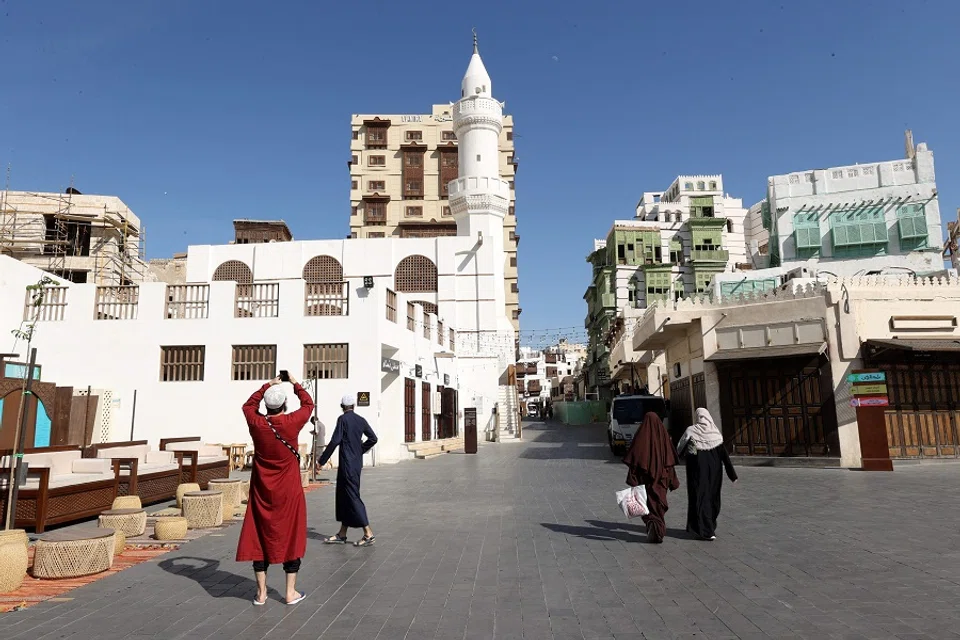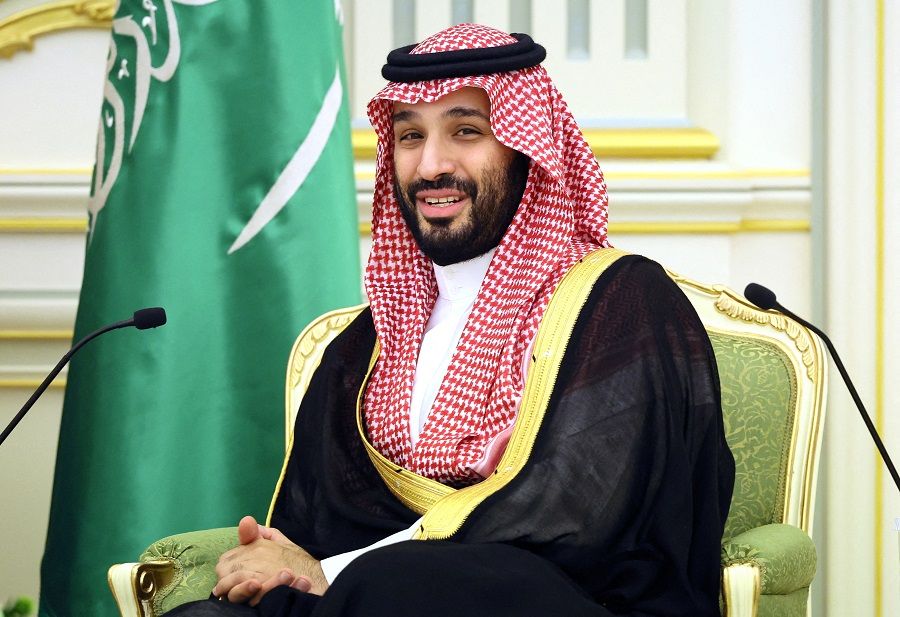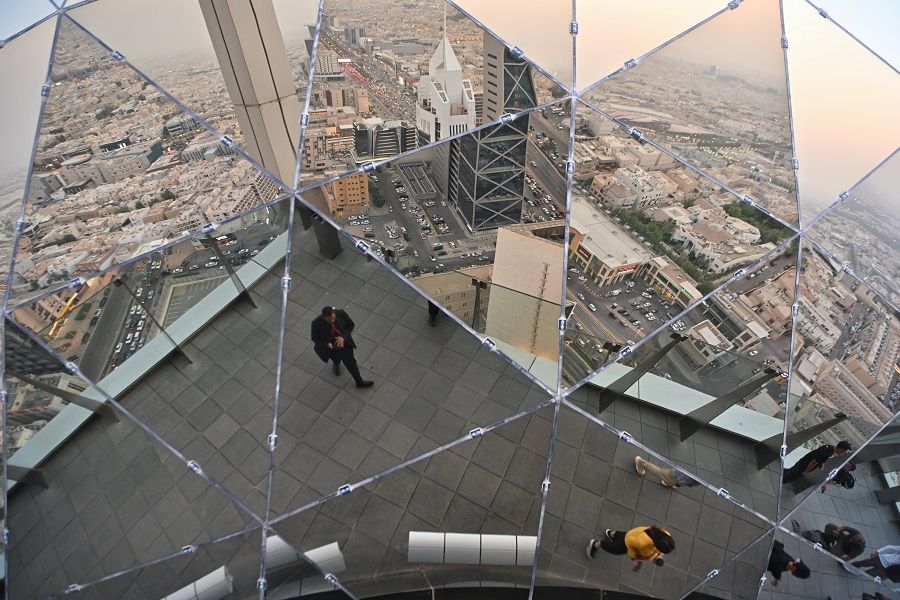Saudi-China relations growing from strength to strength

In February 2024, Saudi Arabia and China started building an ethylene production facility in China's Fujian province with an investment worth US$6.3 billion. At the second edition of the World Defence Show held in Riyadh that same month, the scale of China's presence was only second to the host.
In addition, given increasing tourism, the two countries have pledged to increase air flights, while Ajlan & Bros Holding Group, a private conglomerate headquartered in Riyadh, is facilitating the entry of Chinese companies into the kingdom.
Such developments show that Saudi Arabia and China are expanding their cooperation holistically.
Warm Saudi-China relations since 2016
The upward trend in Saudi-Chinese cooperation started under the incumbent leadership of both countries. In 2016, Saudi Arabia and China agreed to establish a comprehensive strategic partnership during Chinese President Xi Jinping's visit to Saudi Arabia. That same year, China issued its Arab Policy Paper.
In 2019, Crown Prince Mohammed bin Salman (MBS) visited China, and in 2022, Xi made a reciprocal visit to Saudi Arabia. During his visit, Xi participated in the China-Arab States Summit and the China-Gulf Cooperation Council Summit. Both countries also signed a comprehensive strategic partnership agreement, leading the media of both countries to draw synergies between Saudi Vision 2030, Saudi Arabia's "roadmap for economic diversification, global engagement, and enhanced quality of life", and China's Belt and Road Initiative (BRI).
In the area of facilitating people-to-people exchanges and developing cultural exchanges, Saudi Arabia has added the Chinese language to the curriculum of schools and colleges. In November 2023, the Saudi Souk Festival in Shanghai attracted 13,000 visitors, and the country's feature in a Chinese reality show, Davis Hit the Road, led to a 772% spike in searches for "Saudi Arabia" on the online travel services website qunar.com (去哪儿网).
Saudi Arabia also aims to attract over three million Chinese tourists by the end of 2030 through means such as getting the "Approved Destination Status" from China and working with over 700 partners in China, including strategic allies like Trip.com and Tencent's WeChat.
... especially since MBS became the de facto ruler of the kingdom, Saudi Arabia has started diversifying its partnerships.

China and Saudi Arabia have also advanced financial cooperation between their stock exchanges (including Saudi investment in Hong Kong), concluded currency swap arrangements and made plans to expand their trade in local currencies. They also have joint investment projects such as a refinery and petrochemical complex in Liaoning, and plans to develop the AI ecosystem in Saudi Arabia.
On the international front, Riyadh has joined the China-led Shanghai Cooperation Organisation (SCO) as a dialogue partner, and along with several other countries, was invited to join the BRICS (Brazil, Russia, India, China and South Africa) grouping last year.
Shifting US-Saudi relations
Among Saudi Arabia's diplomatic overtures toward other countries, its burgeoning relations with China are of particular concern to the US.
The US had maintained a dominant position in the Gulf and remained Saudi Arabia's closest ally throughout the postwar decades. The oil-for-security arrangement that emerged between the US and Saudi Arabia in the post-World War II period proved robust enough to survive tense Arab-Israeli conflicts in which both countries backed opposing sides. But this equation between Riyadh and Washington has been changing since the turn of the century.
In the past several years, especially since MBS became the de facto ruler of the kingdom, Saudi Arabia has started diversifying its partnerships. At the same time, the gap between Saudi Arabia and the US has widened in different areas. A number of factors have led to these changing dynamics between the two countries.
On the US side, factors include its unconditional support for Israel, the discovery of shale gas in the US which reduced US reliance on Saudi oil, the emphasis from US quarters on the normative differences between Saudi and US cultural values, and in the context of the rise of China, the US shifting the strategic balance to the Indo-Pacific.
... China has shown a willingness to transfer technology to Saudi Arabia, including in the defence sector, nuclear energy and AI.

For the Saudi monarchy, the US turning its commitments away from the security of the region, coupled with the outbreak of the Arab Spring, led them to expand their partnerships. In addition, the ambitious leadership of MBS, who aspires to adopt an independent foreign policy and diversify the kingdom's economy to reduce its dependence on crude oil, was the key driver behind changes in contemporary Saudi Arabia.
China's policies favourable to Saudi Arabia
However, Saudi-US dynamics are not the only factors (re)shaping the regional environment. Many other imperatives, including Chinese policies, also contributed to this.
The growing Saudi-Chinese convergence is rooted in their shared interests, with China seeking crude oil and Saudi Arabia seeking new markets. In view of Saudi Arabia's aspirations for access to technology in different areas, China has shown a willingness to transfer technology to Saudi Arabia, including in the defence sector, nuclear energy and AI. This is in line with its foreign policy approach and assessment of strategic interests, as seen also in its transfer of defence technology to its close partner, Pakistan.
While Saudi Arabia has an ambitious target of 50% localisation of defence procurement by 2030 and even though US weapons are far superior in quality compared to those of China, the strings attached to them and the lack of technology transfer components make them less attractive to the kingdom.
Aside from that, China maintains a non-interference policy and does not interfere in Saudi Arabia's internal affairs. In the past, Riyadh used to voice its concerns against the plight of Muslim minorities in different countries, such as the Kashmiris in India, the Rohingyas in Myanmar, and the Uighurs in China. This was a source of tension in Saudi Arabia's relationship with these countries. However, the new Saudi leadership has significantly toned down this stance, implying that these minority issues are internal matters of the concerned states.
This change has greatly improved Riyadh's relations with these countries. In the case of China, Riyadh not only refrained from commenting on Chinese "harsh measures" against Uighurs but also supported China's policies on the UN human rights platform.
China pursues a relationship with Saudi Arabia from a long-term perspective. This is different from US diplomacy, which has manifested shifts in recent years.

In addition, China's stance on the Palestinian issue, historically and presently in the current Israel-Hezbollah situation, is closer to the Saudi position and the stance adopted by a majority of Islamic states. China emphatically supports a two-state solution. It sent its envoy on a peace mission to the region, held discussions with other stakeholders and hosted a delegation of Arab-Islamic foreign ministers in November 2023. Earlier in March 2023, the Chinese also brokered an agreement leading to the restoration of diplomatic relations between Saudi Arabia and Iran, which grabbed international attention.
Finally, China pursues a relationship with Saudi Arabia from a long-term perspective. This is different from US diplomacy, which has manifested shifts in recent years. For instance, in the early 2010s, the US, under its "pivot to Asia" strategy, abandoned the Middle East to compete with China in the Asia-Pacific region. A few years later, it returned to the region for a similar reason.
From the Saudi Arabian side, steps such as domestic social reforms, the opening up of society, the granting of greater women's rights, the abolishment of religious police, the relaxation of dress codes and the policy allowing foreigners to rent accommodations without proof of their relationship have played a crucial role in breaking overall stereotypes around the kingdom. As these reforms draw international attention, they will no doubt also play a part in attracting Chinese tourists and investors.
China's focus will remain on economic cooperation until the mid-term future. This approach will limit the deepening of Saudi Arabia-China relations in core strategic domains.
Some caveats in the Saudi-China relationship
Along with these developments in Saudi-Chinese relations, some caveats need attention. First, China remains reluctant to get involved in the Gulf region geopolitically, to become a security guarantor, or even to take part in joint security-related arrangements with Saudi Arabia or other regional countries in any explicit way.
China's focus will remain on economic cooperation until the mid-term future. This approach will limit the deepening of Saudi Arabia-China relations in core strategic domains.
Second, Saudi Arabia and the US have been negotiating a mutual defence treaty akin to the ones Washington has with Japan and South Korea. A key component of this proposed treaty is that the US would become a formal security guarantor for Saudi Arabia in exchange for the kingdom's recognition of Israel.
If this treaty is finally signed, Riyadh would likely prioritise its security relationship with the US and become increasingly reliant on American military technology and expertise. This shift would undoubtedly constrain China's burgeoning defence cooperation with Saudi Arabia.
Third, the impression among analysts that Saudi Arabia and China are balancing against the US might be overstated. Saudi Arabia continues to deepen relations with the US and the West. This can be clearly seen from the ongoing Saudi-American negotiations for a comprehensive deal and Saudi Arabia's predominant reliance on the US for arms procurement.
Similarly, China does not see its relations with the kingdom and Saudi-US relations as a zero-sum game. In contrast, the US security umbrella and military presence in the region guarantee regional stability, which is crucial to China's economic and energy interests.

Fourth, a study of Chinese foreign policy demonstrates its penchant for steady growth and this is unlikely to change. This suggests a more gradual growth, which means China will take more time to deepen its relationship with Saudi Arabia.
The hierarchical structure and consistent foreign policy of the CCP suggest that China's relations with Saudi Arabia are likely to continue in a similar direction.
What lies ahead?
The shifting global power structure and political structures of China and Saudi Arabia indicate a further strengthening of the relationship.
The world is witnessing a power shift as the dominance of the US-led West, which has long held sway over Saudi Arabia and the Middle East, declines. This decline is empowering Riyadh to forge new partnerships and broaden its alliances. The power shift also corresponds to China's rise. Therefore, Saudi Arabia and China have greater space to expand their relationship.
Despite how proponents of the "liberal democratic order" view it, the political systems of China and Saudi Arabia inherently support the continuity of their respective policies. China is under one-party rule. President Xi is expected to remain in power for the foreseeable future after the Chinese Communist Party (CCP) abolished the two-term limit for the presidency.
Even if Xi were to step down, any new leadership would come from within the CCP. The hierarchical structure and consistent foreign policy of the CCP suggest that China's relations with Saudi Arabia are likely to continue in a similar direction.
Similarly, Saudi Arabia operates as a constitutional monarchy. The current de facto ruler, MBS, is 38 years old and, under normal conditions, is likely to stay in power for a long period of time. Therefore, the Saudi Arabia-China relationship bodes well for the future.
